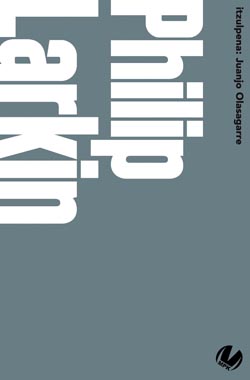
Eraikina
Hotelik dotoreena baino garaiago
urrutitik ikusten zaio galdor argitsua, baina begira,
goraka-beheraka karrika estuak
joan den mendearen hasperen handi baten gisa.
Doilorrak dira atezainak; atariko horiek
ez dira taxiak; ezkaratzari
landare igokariez gain usain beldurgarria dario.
Hortxe nobelaxkak, eta tea katilu gehienetan,
aireportuko aretoetan bezala, baina altzairuzko aulki ilaretan
aldizkari higatuak gainbegiratzen ari diren otzan horiek
ez datoz urrundik. Gehienez jota, auzo autobusez etorri dira.
Kaleko arropak, eta erosketa poltsak erdi beterik
eta aurpegiak egon-ezez, etsirik, noizbehinka
erizain antzeko bat ageri bada ere
baten baten eske: gainontzekoek katilua
platerean utzi, eztul egin edo aulkien azpian
begiratzen dute eskularru edo paper baten bila.
Gizakiak, eremu bitxi eta neutral honetan preso, etxe eta izenak
behin-behineko etenaldian; batzuk gazteak dira,
besteak zaharrak, gehienak, ordea, aukeren amaiera,
azken esperantza aldarrikatzen duen adin lauso horretakoak.
Denak ere zerbait gaizki dabilela aitortzera etorri dira.
Okerrak galanta behar du.
Begira, bestela, zenbat solairu behar dituen, zer altuera
hartu duen, zenbat diru doan zuzendu
nahian; begira zer ordu den
lanegun bateko hamaika eta erdiak,
hemengook, ordea, hortik bazterturik; begira
dagokien sailera doazela nola so egiten dioten
elkarri, igarri guraz; gurpil gainean daramate bat,
saileko maindire zirtzilduetan bildurik.
Denek ikusi dute. Lasai. Elkarren kide
direla ohartzeak lasaitu egiten ditu,
ate horiez harantzago gelak daude, gelaz harantz,
gela gehiago, zenbat eta urrutiago
orduan eta itzultzeko gaitzago; nork daki
zein ezagutuko duten, eta noiz? Oraingoz zain daude
patioari begira. Kanpoan dena zahar askoa:
adreilu gorrixkak, tutu forratuak, eta oinezko bat
aparkalekuan, aske. Langaz harantzago
trafikoa; eliza itxi bat; kale kantoiak
non umeak dostatzen baitira, eta neska orraztuak
biltzen baitituzte arropak labanderiatik— Oi mundua
zure amodioak, zure zoriak hemengo eskuez
harantzago daude! Irreala, hara, ukitzearekin bat
elkarrekin urrumatzen gaituen ametsa;
hortik bakarrik esnatzen, ordea! Hor harrokeria
eta ignorantzia babesgarria mamitu egiten dira
bizitza garraiatzeko, eta urtu soil-soilik
pasillo hauetara deitzen dituztenean (ze erizaina keinuka
ari baita atzera)— Banan-banan jaiki eta badoaz.
Azkenean. Batzuk eguerdirako aterako dira edo lauretarako;
beste batzuk, ez badakite ere, etorriak dira
ilara zuritan apartaturik datzan kongregazio
ezkutua osatzera— gizon, emakume,
zahar, gazte; leku honek onartu txanpon
bakarraren alde latzak. Denek dakite hilko direla.
Orain ez, beharbada, hemen ez, baina noizbait bai
eta horrelako leku batean. Hori esan nahi du
txukun moldatu malkor honek; heriotzaren ideia
transzenditzeko ahalegina, izan ere, katedralen boterea bainoago
ez badu, ezerk ez du oztopatuko
ilunpeen etorrera, nahiz eta jendetza arratsero saiatu
alferreko lore makal faboragarriekin.
The Building
Higher than the handsomest hotel / The lucent comb shows up for miles, but see, / All round it close-ribbed streets rise and fall / Like a great sigh out of the last century. / The porters are scruffy; what keep drawing up / At the entrance are not taxis; and in the hall / As well as creepers hangs a frightening smell. // There are paperbacks, and tea at so much a cup, / Like an airport lounge, but those who tamely sit / On rows of steel chairs turning the ripped mags / Haven’t come far. More like a local bus, / These outdoor clothes and half-filled shopping bags / And faces restless and resigned, although / Every few minutes comes a kind of nurse // To fetch someone away: the rest refit / Cups back to saucers, cough, or glance below / Seats for dropped gloves or cards. Humans, caught / On ground curiously neutral, homes and names / Suddenly in abeyance; some are young, / Some old, but most at that vague age that claims / The end of choice, the last of hope; and all // Here to confess that something has gone wrong. / It must be error of a serious sort, / For see how many floors it needs, how tall / It’s grown by now, and how much money goes / In trying to correct it. See the time, / Half-past eleven on a working day, / And these picked out of it; see, as they climb // To their appointed levels, how their eyes / Go to each other, guessing; on the way / Someone’s wheeled past, in washed-to-rags ward clothes: / They see him, too. They’re quiet. To realise / This new thing held in common makes them quiet, / For past these doors are rooms, and rooms past those, / And more rooms yet, each one further off // And harder to return from; and who knows / Which he will see, and when? For the moment, wait, / Look down at the yard. Outside seems old enough: / Red brick, lagged pipes, and someone walking by it / Out to the car park, free. Then, past the gate, / Traffic; a locked church; short terraced streets / Where kids chalk games, and girls with hair-dos fetch // Their separates from the cleaners — O world, / Your loves, your chances, are beyond the stretch / Of any hand from here! And so, unreal, / A touching dream to which we all are lulled / But wake from separately. In it, conceits / And self-protecting ignorance congeal / To carry life, collapsing only when // Called to these corridors (for now once more / The nurse beckons —). Each gets up and goes / At last. Some will be out by lunch, or four; / Others, not knowing it, have come to join / The unseen congregations whose white rows / Lie set apart above — women, men; / Old, young; crude facets of the only coin // This place accepts. All know they are going to die. / Not yet, perhaps not here, but in the end, / And somewhere like this. That is what it means, / This clean-sliced cliff; a struggle to transcend / The thought of dying, for unless its powers / Outbuild cathedrals nothing contravenes / The coming dark, though crowds each evening try / With wasteful, weak, propitiatory flowers.